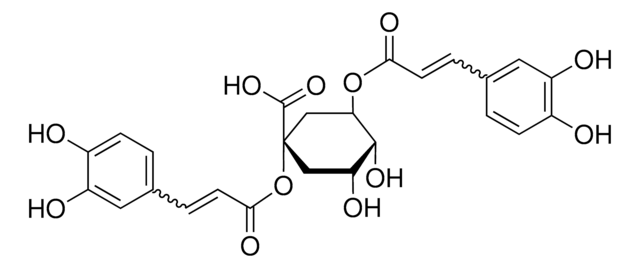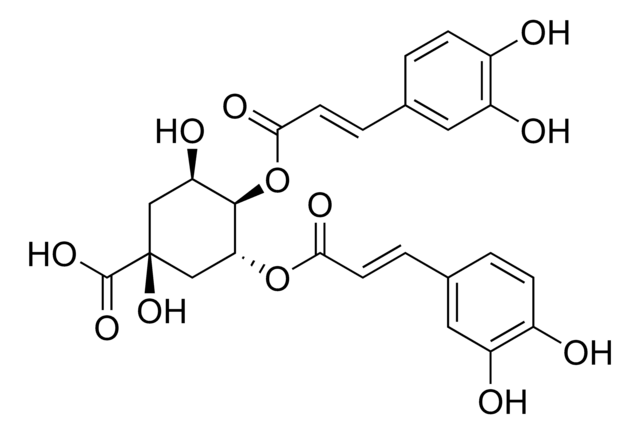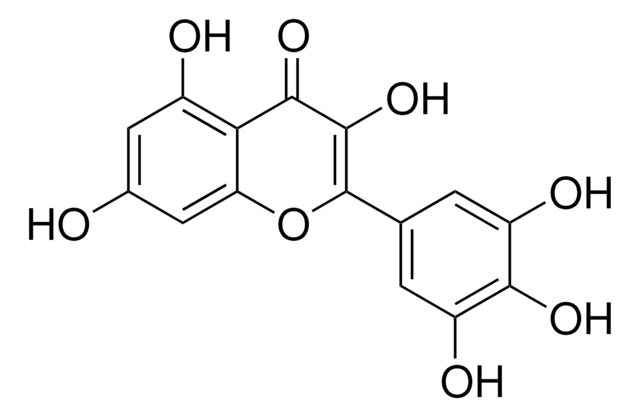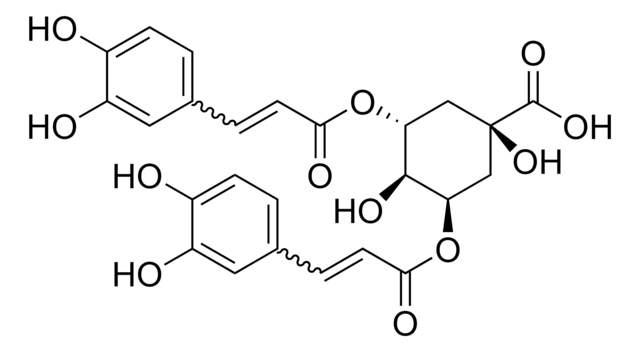SBR00002
Arzanol
from Helichrysum italicum, ≥98%
Sinónimos:
3-[[3-Acetyl-2,4,6-trihydroxy-5-(3-methyl-2-buten-1-yl)phenyl]methyl]-6-ethyl-4-hydroxy-5-methyl-2H-pyran-2-one
About This Item
Productos recomendados
biological source
Helichrysum italicum
Quality Level
assay
≥98%
form
powder
application(s)
metabolomics
vitamins, nutraceuticals, and natural products
storage temp.
−20°C
SMILES string
OC1=C(CC2=C(O)C(C)=C(CC)OC2=O)C(O)=C(C(C)=O)C(O)=C1CC=C(C)C
InChI
1S/C22H26O7/c1-6-16-11(4)18(24)15(22(28)29-16)9-14-19(25)13(8-7-10(2)3)20(26)17(12(5)23)21(14)27/h7,24-27H,6,8-9H2,1-5H3
InChI key
ZOIAPLVBZQQHCG-UHFFFAOYSA-N
General description
Application
Biochem/physiol Actions
Arzanol inhibits the activation of inflammatory transcription factor NFκB, HIV replication in T cells, releases of IL-1β, IL-6, IL-8, and TNF-α,and biosynthesis of PGE2 by potentially inhibiting the mPGES-1 enzyme.
Arzanol inhibits the activation of inflammatory transcription factor nuclear factor-KB (NF-KB), human immunodeficiency virus (HIV) replication in T cells, releases of interleukin (IL)-1β, IL-6, IL-8, and tumor necrosis factor (TNF)-α and biosynthesis of prostaglandin E2 (PGE2) by potentially inhibiting the mPGES-1 enzyme. It also possesses antioxidant and cytotoxic activity.
Reconstitution
Storage Class
11 - Combustible Solids
wgk_germany
WGK 3
flash_point_f
Not applicable
flash_point_c
Not applicable
Elija entre una de las versiones más recientes:
Certificados de análisis (COA)
¿No ve la versión correcta?
Si necesita una versión concreta, puede buscar un certificado específico por el número de lote.
¿Ya tiene este producto?
Encuentre la documentación para los productos que ha comprado recientemente en la Biblioteca de documentos.
Nuestro equipo de científicos tiene experiencia en todas las áreas de investigación: Ciencias de la vida, Ciencia de los materiales, Síntesis química, Cromatografía, Analítica y muchas otras.
Póngase en contacto con el Servicio técnico







